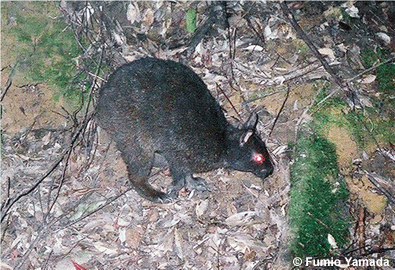Japanese scientists have created a cloned embryo from the dead body of a top ranking EDGE rabbit and are hoping for a birth.
The Amami rabbit, or Pentalagus furnessi, lives on only two small islands in southwestern Japan. It is designated as endangered species by Japan’s environment ministry, with an estimated population of less than 5,000.
Ranked 43= on the EDGE mammal list, the Amami rabbit is one of the most primitive lagomorphs (the group that comprises rabbits, hares and pikas) in the world. It is threatened by the Java mongoose, which has killed large numbers of rabbits since its introduction in 1979, and loss of its forest habitat to logging. Recommended conservation actions include habitat restoration and predator control initiatives to mitigate these threats
Professor Yoshihiko Hosoi of Kinki University in the western city of Osaka said his team had extracted a cell from a dead Amami rabbit’s ear and put it into the egg of an ordinary rabbit.
“After we confirmed that the egg developed into a cloned embryo, we put it back into the fallopian tube of the host mother,” Hosoi said.
“In about 30 days the host mother may give birth to a baby rabbit which has the gene information of Amami rabbit,” he told AFP, but added the possibility of pregnancy was less than 10 percent which is normal for cloned animals.
The experiment, which would be the first cloning of an endangered species in Japan and just one of a few cases in the world, is expected to help protect endangered species from the risk of inbreeding, Hosoi said.
“If we can use the gene information of a dead body, it will help avoid inbreeding which could lead to a genetic abnormality or frail offspring,” he said.
